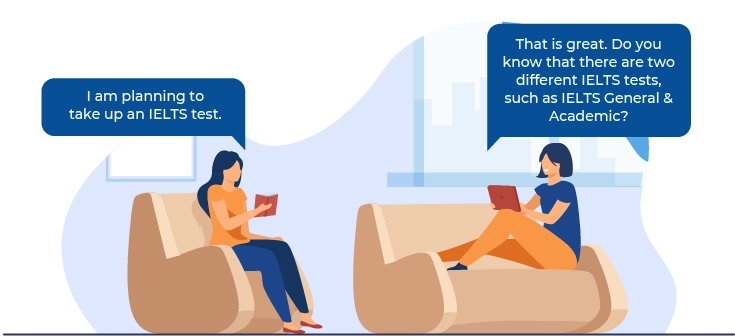IELTS General Training is designed for individuals who want to live and work in an English-speaking country. In contrast, the IELTS Academic test is intended for students seeking to pursue higher education abroad.
Today, IELTS is accepted in more than 3,400 institutions in the US and thousands of institutions in English-speaking countries. This widespread acceptance underscores the test’s importance for individuals seeking international education or professional advancement. Choosing between the two versions depends significantly on your goals—whether you intend to study or migrate.
So, if you are confused about which IELTS Test to choose, then here is a comprehensive guide that will clarify the differences between the IELTS Academic and General Training tests.
IELTS Exam Format and Details
The International English Language Testing System (IELTS) is an English language exam that validates a candidate’s English language proficiency to work or study abroad. Whether you plan to study or work in countries like Australia, Canada, New Zealand, the UK, or the USA, you will have to qualify for a language assessment test like IELTS or OET. The IELTS exam is administered by the British Council, IDP Education, and Cambridge Assessment English.
Exam Name: International English Language Testing System (IELTS)
Duration: 2 hours 40 minutes (Listening, Reading, Writing) + 11-14 minutes (Speaking)
Number of Questions:
- Listening: 40 questions
- Reading: 40 questions
- Writing: 2 tasks
- Speaking: 3-part interview
Exam Format Options:
- Computer-Based: AED 1,370
- Paper-based: AED 1,270 (UAE residents only)
Certification Validity: 2 years from the date of issue
Exam Administration: IDP and British Council
Prerequisites: Valid passport required
What is the difference between IELTS Academic and IELTS General?
IELTS Academic and IELTS General are the two types of IELTS tests. These tests have similarities and differences. Therefore, if you plan to take an IELTS test, you must be aware of the difference between the IELTS Academic and General tests. The following table showcases the differences between Academic IELTS and General Training IELTS;
| Exam Section |
Academic IELTS |
General IELTS |
| Purpose |
Higher education or professional registration. |
Migration, secondary education, or work purposes. |
| Reading |
Academic texts (journals, books, research articles). |
Everyday texts (ads, newspapers, workplace documents).
1 passage of academic interest |
| Writing Task 1 |
Describe graphs, charts, or diagrams. |
Write a letter (formal, semi-formal, or informal). |
| Writing Task 2 |
Formal essay writing. |
Formal essay writing |
| Speaking |
Tests fluency, pronunciation, coherence, grammar and vocabulary |
Tests fluency, pronunciation, coherence, grammar and vocabulary |
| Listening |
Tests understanding of spoken English. |
Tests understanding of spoken English. |
IELTS Academic Test
The IELTS Academic test is designed to assess applicants' English-language skills, especially those skills that are relevant when studying at undergraduate or postgraduate levels. This is also the reason why you should pursue the IELTS test to study at an undergraduate or postgraduate level.
IELTS Academic Listening Test
The IELTS Academic listening section consists of four parts, with a total of 40 questions. Each part focuses on different types of conversations.
- Parts 1 and 2: Focus on everyday social situations. (Part 1: A conversation between two speakers, for example, discussing travel plans and Part 2: A single speaker, for example, giving a speech about local facilities).
- Parts 3 and 4: Focus on educational and training scenarios. (Part 3: A discussion between two main speakers, possibly guided by a tutor, for example, university students and Part 4: A single speaker discussing an academic topic).
- Time Allowed: Approximately 30 minutes (+10 minutes to transfer answers).
- Total Questions: 40
- Scoring: Each correct answer earns 1 mark; the final score is in whole or half bands (e.g., 5.5, 7.0).
|
 Important Note: Important Note:
- You will hear the recordings only once.
- Different English accents will be used, including British, Australian, New Zealand, and North American.
|
IELTS Academic Reading Test
The reading section features texts sourced from books, journals, magazines, and online resources, designed for a non-specialist audience. These texts are of general interest for undergraduate or postgraduate students and may vary in style. Key Features include;
- At least one text will present a detailed logical argument.
- Texts can include diagrams, graphs, or illustrations.
- Technical vocabulary will have simple definitions provided.
- Time Allowed: 60 minutes (including transfer time).
- Number of Sections: 3
- Total Text Length: 2150–2750 words
- Total Questions: 40
- Scoring: Each correct answer earns 1 mark; final scores range from 1–9 in whole or half bands (e.g., 4, 6.5).
IELTS Academic Writing Test Overview
The writing section consists of two tasks, both of which must be completed.
- Task 1: Describe visual information (like a graph or chart) in your own words. You need to write at least 150 words in about 20 minutes.
- Task 2: Discuss a point of view, argument, or problem. You must write at least 250 words in about 40 minutes.
- Time Allowed: 60 minutes
- Number of Tasks: 2
- Scoring: Task 2 contributes twice as much as Task 1 to the Writing score.
IELTS Academic Speaking Test
The speaking test is a face-to-face interview with an examiner and is recorded. It has three parts that assess different speaking abilities.
- Part 1: You will answer questions about yourself and familiar topics (like home, family, studies, or interests).
- Part 2: You will receive a card with a topic to discuss. You will have one minute to prepare and then must speak for up to two minutes, followed by general questions.
- Part 3: This part involves deeper questions related to the topic discussed in Part 2.
- Time Allowed: 11–14 minutes
- Number of Parts: 3
IELTS General Test
The IELTS General Training test is designed for individuals who want to migrate to English-speaking countries like Australia, Canada, New Zealand, or the UK, or for those looking to train or study below degree level. The test consists of four papers: Listening, Reading, Writing, and Speaking. While the Listening and Speaking tests are the same for both Academic and General Training, the Reading and Writing tests differ.
IELTS General Listening Test
The IELTS General Listening Section has four parts, each containing 10 questions. The questions follow the order of information presented in the recordings.
- Parts 1 and 2: Focus on everyday social situations.
- Part 1: A conversation between two speakers (e.g., discussing travel plans).
- Part 2: A single speaker (e.g., giving a speech about local facilities).
- Parts 3 and 4: Focus on educational and training contexts.
- Part 3: A conversation between two main speakers, possibly guided by a tutor (e.g., university students).
- Part 4: A single speaker discussing an academic topic.
- Time Allowed: Approximately 30 minutes (+10 minutes to transfer answers).
- Total Questions: 40
- Scoring: Each correct answer earns 1 mark; the final score is given as a band score in whole or half bands (e.g., 5.5, 7.0).
|
 Key Points: Key Points:
- You will hear the recordings only once.
- Different English accents will be used, including British, Australian, New Zealand, and North American.
|
IELTS General Reading Test
The Reading Section consists of three sections that increase in difficulty.
- Section 1: Covers everyday topics, such as notices, advertisements, and timetables, which are essential for living in an English-speaking country.
- Section 2: Focuses on work-related topics, including job descriptions, contracts, and training materials.
- Section 3: Deals with a topic of general interest, featuring longer and more complex texts taken from newspapers, magazines, books, and online resources. This section is descriptive and instructive.
- Time Allowed: 60 minutes (including transfer time).
- Total Text Length: 2150–2750 words
- Total Questions: 40
- Scoring: Each correct answer earns 1 mark; final scores range from 1–9 in whole or half bands (e.g., 3, 8.5).
IELTS General Writing Test
The Writing Section includes two tasks, both of which must be completed.
- Task 1: Write a letter responding to a situation, such as asking for information or explaining a circumstance. You need to write at least 150 words in about 20 minutes.
- Task 2: Discuss a point of view, argument, or problem. You must write at least 250 words in about 40 minutes.
- Number of Tasks: 2
- Scoring: Task 2 counts twice as much as Task 1 for the Writing score.
IELTS General Speaking Test
The Speaking test is a face-to-face interview with an examiner and is recorded. It consists of three parts that assess different speaking abilities.
- Part 1: You will answer questions about yourself and familiar topics, such as home, family, studies, or interests.
- Part 2: You will receive a card with a specific topic to discuss. After one minute to prepare, you must speak for up to two minutes and then answer general questions related to the topic.
- Part 3: This part involves more detailed questions about the topic discussed in Part 2.
- Time Allowed: 11–14 minutes
- Number of Parts: 3
IELTS Academic Vs IELTS General Score
The IELTS is scored on a nine-band scale, with each band corresponding to the competence and level of the candidate in the English language. The duration of the IELTS test is 2 hours and 45 minutes. There are also two kinds of IELTS available, that is general and academic. However, getting a
7+ band score in IELTS is often not easy. You need to undergo proper IELTS training to achieve your targeted IELTS score. Take a look at the IELTS Academic and IELTS General Scores.
|
IELTS Academic Score
|
| |
Writing
|
Reading
|
Speaking
|
Listening
|
Overall
|
|
University Admission
|
6
|
6
|
6
|
6
|
6.5
|
|
Govt Owned University
|
7
|
7
|
7
|
7
|
7.5
|
|
Ph.D.
|
7.5
|
7.5
|
7.5
|
7.5
|
7.5-minimum
|
|
IELTS General Score
|
| |
Writing
|
Reading
|
Speaking
|
Listening
|
Overall
|
|
Care Giver
|
4 - 4.5
|
4 - 4.5
|
4 - 4.5
|
4 - 4.5
|
4 - 4.5
|
|
Chef
|
5
|
5
|
5
|
5
|
5
|
|
Driver
|
5
|
5
|
5
|
5
|
5
|
|
Medical Professionals
|
7
|
7
|
7
|
7
|
7
|
|
For getting Canada PR
|
7
|
7
|
7
|
8
|
8
|
|
Province
|
8.5
|
8.5
|
8.5
|
8.5
|
8.5
|
Summing Up
Now that you know the difference between IELTS Academic and IELTS General, it's time to prepare for the exam. With efficient
IELTS training classes and practice, students will not only learn to excel in the exam but also understand the
mistakes to avoid in an IELTS Test. The IELTS General Test is comparatively more straightforward than the IELTS Academic test. The scoring format is different in both the tests regarding one band. You can opt for IELTS General Training if you wish to work in an organization or undertake any training in an English-speaking country. You can also attend this course if you wish to emigrate to an English-speaking country for residence.
The two IELTS tests are designed for specific people, and the tests have differences. However, we know that the IELTS is accepted in more than 3000 institutions in the US and in thousands of English-speaking countries. So start your IELTS journey today to explore vast career opportunities with enhanced communication skills.
Locations Where Edoxi Offers IELTS Course
Here is the list of other major locations where Edoxi offers IELTS Course
 Blessy Babu
Mar 19, 2025
Blessy Babu
Mar 19, 2025

